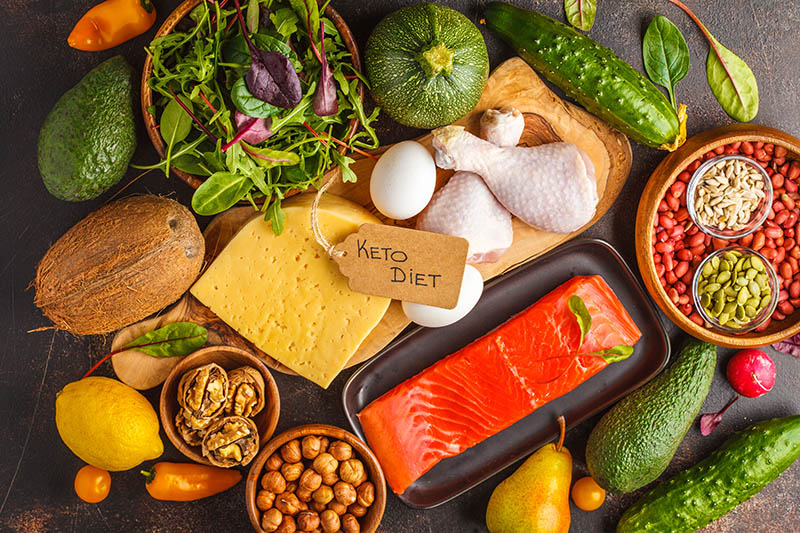
Everyday Chemicals Are Screwing Up Your Testosterone
You may have already read my other article on 7 habits which are killing your testosterone. There was a section in that on Water because

Diet makes up 70% of the results that you see in the mirror, but with all of the diet books out there making big promises, is there one that’s legit?
The ketogenic diet has had quite the fanfare during the last decade, but it’s been used since the 1920s.
If you’re considering adopting the diet this year, there are five ketogenic diet supplements you should know about as they can significantly improve your transition into ketosis while avoiding common beginner mistakes.
If you’ve ever watched a commercial for sports drinks, chances are you’ve heard the term electrolytes.
You can think of electrolytes like an advanced electrical messaging system, ensuring cells can communicate with one another. (1)
It’s thanks to electrolytes that cells maintain normal bodily functions such as movement and speech. (Quite the responsibility!)
When you start the ketogenic diet, it’s encouraged to supplement with electrolytes, especially sodium, magnesium, and potassium.
This is because when insulin levels drop as a result of reduced carbohydrate consumption, the body will flush out both water and electrolytes.
If electrolyte levels drop too low, this causes the flu-like symptoms (e.g., fatigue, brain fog, etc.) that people often describe as the “keto flu” when they start the diet.
I recommend taking one or two servings of an electrolyte supplement each day with plenty of water.
Considered a ketogenic staple, medium-chain triglyceride oil is a fast-digesting and clean-burning form of healthy fats that can support your journey to ketosis.
Medium-chain triglycerides have been shown to be easier to digest and far more bioavailable than long-chain triglycerides.
What’s more, studies show that MCT oil is easier to convert into ketone bodies than long-chain fatty acids, which is essential for someone who wants to switch their energy source from carbohydrates (glucose) to fats (ketones). (2)
Adding MCT oil to your daily meal planning routine can help you achieve ketosis faster. I recommend adding it to your morning coffee or pre-workout protein shake.
Whenever you drastically change your macronutrient ratio or introduce a new food group that you’ve never eaten before, your body will need time to adjust.
Many people report indigestion and diarrhea during the first week or two on the keto diet. While tummy troubles aren’t unique to the ketogenic diet, they are something to be aware of.
Since you’re dramatically increasing your intake of fat while cutting down on carbohydrates, your stomach might need an extra hand. This is where digestive enzymes can help. (3)
If you’ve never eaten a large amount of fat-based foods before, digestive enzymes can support your body’s ability to break down fat and assimilate the nutrients within.
Beta-Hydroxybutyrate, more commonly known as BHB, is an actual ketone body. It’s naturally produced in the liver when fatty acids are turned into ketones. But it’s also available in supplement form as a salt or ester. (4)
BHB is ideal for two types of keto dieters:
For the newbies, BHB can reduce the time needed to enter a state of burning ketones for fuel. For the experienced keto dieter, BHB can temporarily induce an instant state of ketosis, helping you bounce back from that carb binge.
Elimination diets are effective for discovering foods that you are allergic to or that are causing digestive issues.
Once you find the food that gives you trouble, you simply find alternatives that supply a similar nutrient content.
Sometimes, when people start the ketogenic diet, they cut out foods without finding the keto-friendly alternative to replace the lost nutrients. Fruits are an excellent example.
If you’re been eating high carbohydrate fruits like oranges and you suddenly stop, you may accidentally become deficient in vitamin C.
In other words, cutting out carbohydrate-focused foods could mean that you involuntarily get less of certain nutrients such as phytonutrients, chromium, and vitamins C and K.
A whole-food-based multivitamin can help to bridge the nutritional gaps that suddenly appear after starting a ketogenic diet.
Not only can this help you potentially avoid keto flu symptoms and indigestion, but it’ll ensure you don’t become deficient in a specific micronutrient.
However, you need to make sure your multi has clinical doses of its whole food ingredients and not just “token amounts” so they can put it on the label but doesn’t provide any real benefit.
See our article on how to choose the right multivitamin.
The ketogenic diet is a scientifically proven way to lose weight, increase cognitive performance, and improve overall health.
If it’s your first time attempting to go keto or if you’ve tried in the past with little success, these keto supplements can help you achieve ketosis and see results.
References

You may have already read my other article on 7 habits which are killing your testosterone. There was a section in that on Water because

Rhodiola Rosea stands out as a potent adaptogenic herb with a rich history of traditional use and a growing body of scientific research. Revered for

In this comprehensive article, we will explore what L-tyrosine is, its benefits as a pre-workout supplement, the correct dosage, and other potential health benefits it

Betaine anhydrous is becoming an increasingly popular ingredient for pre-workouts. In this article, we will explore the fundamentals of betaine anhydrous, its connection to carnosine,

Beta-alanine is a pre-workout powerhouse. From boosting workout performance to potential anti-aging effects, discover why this amino acid is a favorite among health buffs.

You may have already read my other article on 7 habits which are killing your testosterone. There was a section in that on Water because

Rhodiola Rosea stands out as a potent adaptogenic herb with a rich history of traditional use and a growing body of scientific research. Revered for

In this comprehensive article, we will explore what L-tyrosine is, its benefits as a pre-workout supplement, the correct dosage, and other potential health benefits it
Discount Applied Successfully!
Your savings have been added to the cart.